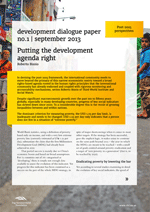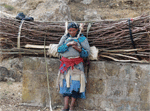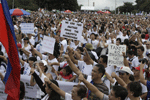Published on Mon, 2013-09-23 09:48
The Report Collecting Inputs from Marginalised populations on the Post 2015 Development Agenda says that in the last 15 years in Thailand there has been improvement in some important social services, such as education and healthcare, and people have grown more aware of their rights. However, rapid economic growth also widened the gap between different parts of the country and groups of people in the society, leading to marginalisation and growing disparities. For many of these people life became more insecure: loss of source of livelihood (job, land, access to natural resources), identity crisis, deterioration of social relations, and disempowerment. This has been attributed by many to the economic development approach adopted over the years, which led to the commodification of natural resources and food. In parallel, public sector governance structure did not allow for significant people’s participation in the policy and decision-making processes at the local level. |
Published on Thu, 2013-09-19 00:00
In devising the post-2015 framework, the international community needs to move beyond the primacy of this narrow economistic metric toward a broad rights-based agenda rooted in the human rights principles that the international community has already endorsed and coupled with rigorous monitoring and accountability mechanisms, writes Roberto Bissio of Social Watch. Despite significant macroeconomic growth over the past ten to fifteen years globally, especially in many developing countries, progress of key social indicators has slowed down since 2000. To a considerable degree this is the result of growing inequalities between and within nations. |
Published on Wed, 2013-09-18 00:00
Brazilian development policy underwent a major transformation in the last decade, having the Brazilian Development Bank (BNDES, by its acronym in Portuguese) as the great symbol of this process. In 2004 disbursements by the bank were in the order of USD 40 billion, while in 2010 they totaled over USD 168 billion. This growth by the bank occurred with a clear intention of the Brazilian government. The two main sources of bank financing are the Workers’ Support Fund and the National Treasury, but while the former has a fixed value (40 per cent of the fund), the amount deposited by the Treasury varies from Brazilian Real 43 billion in 2008 to a staggering 376 billion in 2012. However if the rise and importance of the bank in the last decade is unquestionable, the development model chosen raises many doubts. |
Published on Tue, 2013-09-17 00:00
The ongoing Post-2015 development agenda (including the SDGs) process is still short of prioritising the special needs and challenges of the LDCs and its peoples. The MDGs, albeit minimal in scope, has a dedicated target pertaining to the LDCs under Goal 8: Develop a global partnership for development. Conversely, the proposed new-generation goals in the report by the UN Secretary-General’s High-Level Panel of Eminent Persons on the Post-2015 Development Agenda (HLP) dilute the due special development attention to the LDCs. A stand-alone goal targeting global development partnership for the LDCs is a non-negotiable along with a cross-cutting treatment with specific reference premised upon their special situations and vulnerabilities. |
Published on Fri, 2013-09-13 22:48
“The abolition of the pork barrel system should be total” said Leonor Briones, lead convenor Social Watch Philippines, to a Congressional committee in Manila, bringing to legislators the message that hundreds of thousands of people had reaffirmed in the streets during marches against corruption in the previous days. “Pork barrel” is the popular name of a system that allows members of parliament the direct allocation of budget funds to pet projects in their constituencies. Some “pork barrel amount to the equivalent of four million dollars a year. The president himself manages a “pork barrel fund” of some 500 million dollars and several items of the Special Purpose Funds (SPF) in the national budget for 2014. “SPFs breed corruption. How can Congress scrutinize the SPF when there is no detail? It is just one chart in the budget documents and one line in the summary papers,” SWP said Briones. |
SUSCRIBE TO OUR NEWSLETTER







